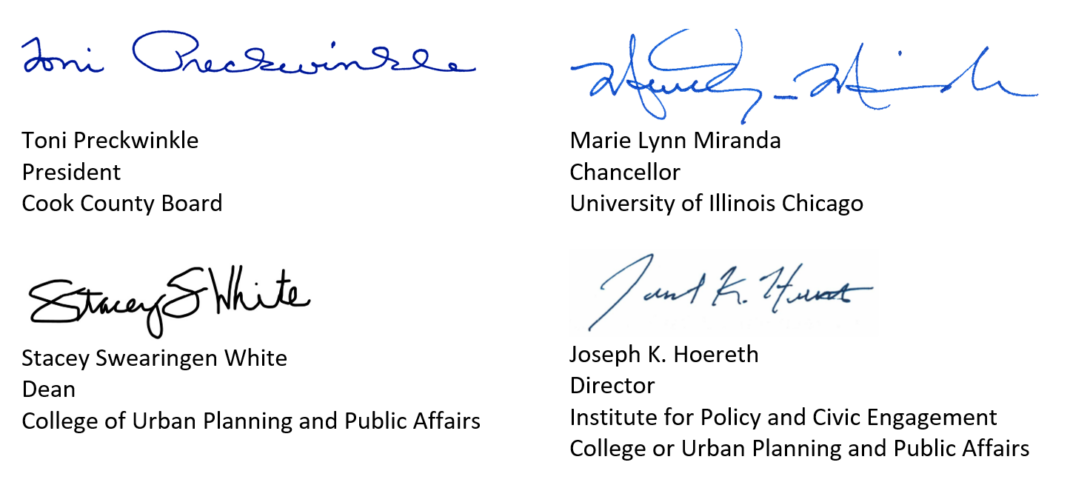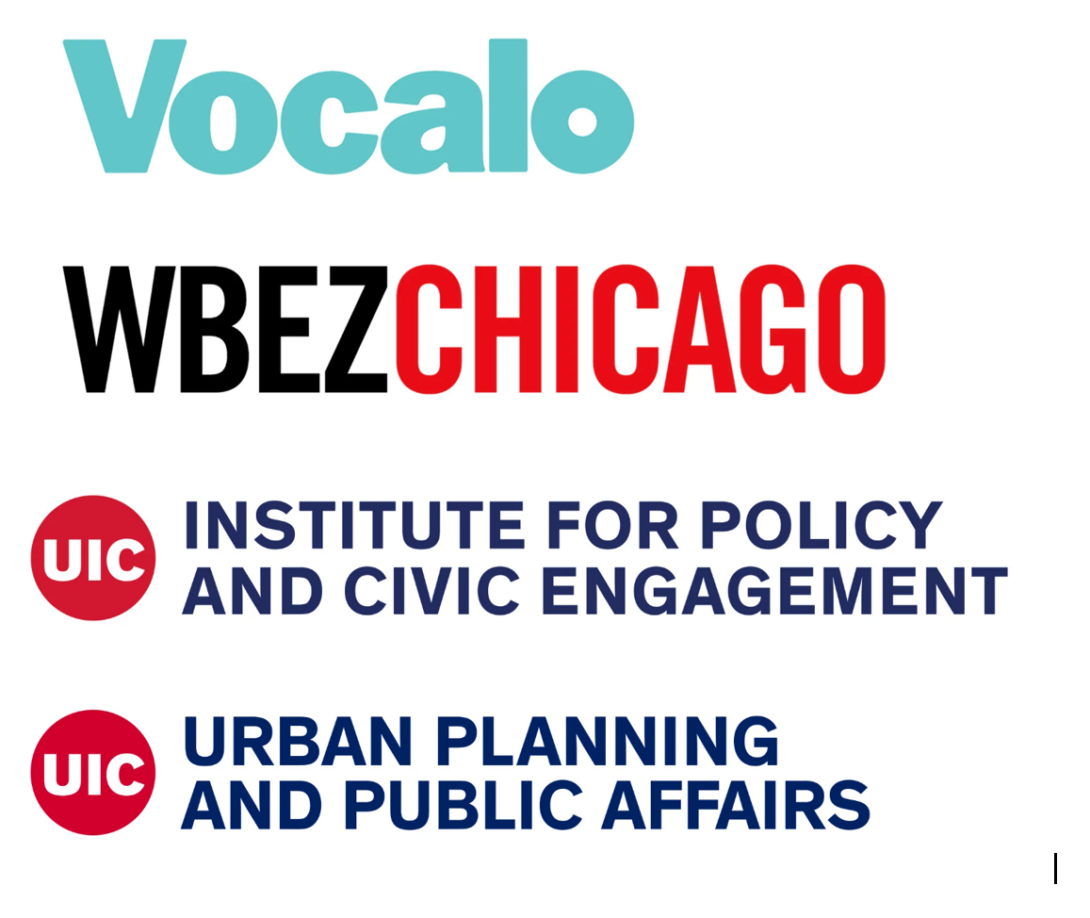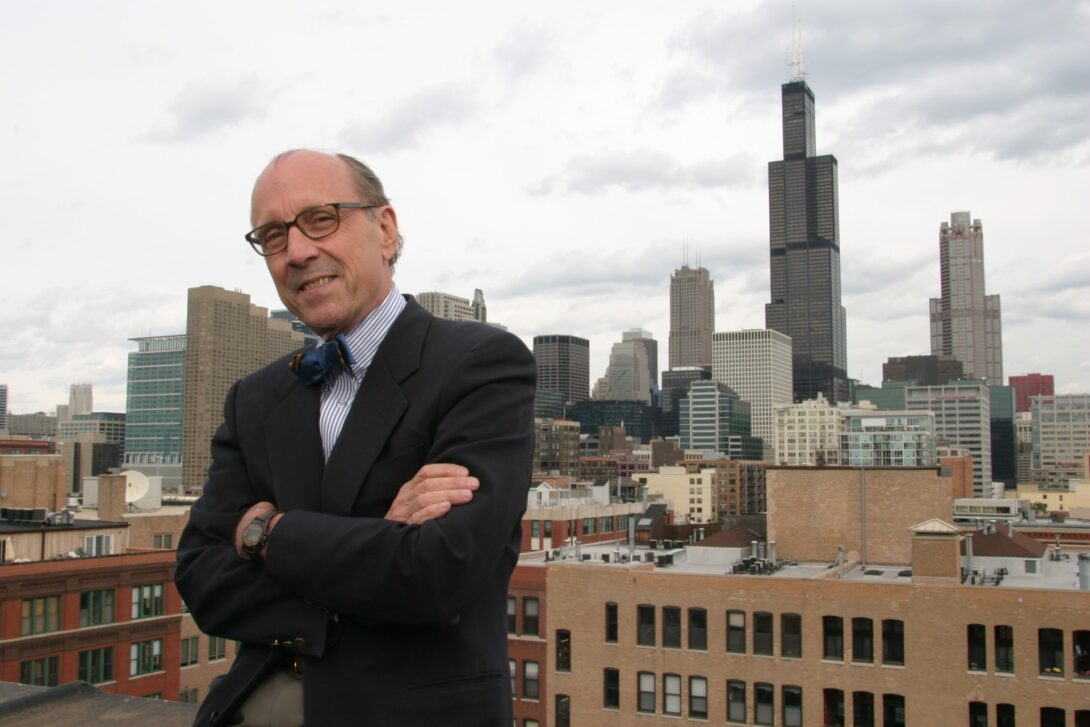Program
Welcome to the 2025 Urban Forum
April 2025
As the hosts of the Urban Forum, we welcome you to UIC, a university committed to providing the broadest access to the highest levels of educational, research, and clinical excellence. From our campus in the heart of Chicago, UIC serves 33,000 students from diverse backgrounds. UIC is the only public R1 university in Chicago. We take great pride in the fact that 56% of our undergraduates are Pell recipients and that we receive more than half a billion dollars in research funding annually. We are living proof that access and excellence can and should be achieved together. The University is also home to the College of Urban Planning and Public Affairs (CUPPA), where teaching, research, and community engagement focus on building just, resilient, and livable communities.
The participants at this year’s Urban Forum will continue our efforts to advocate for urban communities here and around the world. The university has hosted the Urban Forum since 1995, in various incarnations. But the single commonality is our work to promote the wellbeing of our urban population centers and their people. The 2024 UIC Urban Forum: “Chicago Futures” will carry on the tradition by exploring the question: what will the next 50 years bring, and how will Chicago confront the challenges of climate change, growing income inequality, and health disparities?
When the UIC Department of Urban Planning and Policy (UPP) was founded in 1973, Chicago was a very different city. This year’s Urban Forum celebrates the recent 50th anniversary of UPP with a focus on the City and its possible futures, by reflecting on its history, critiquing its present, and imagining ways planners and other urbanists can help Chicago address challenges moving forward. Urban Planning faculty had a direct hand in envisioning and planning Urban Forum, which is made evident by the program, rich with speakers who offer a broad array of perspectives, roles, and experiences in Chicago. We can think of no better way to honor this wonderful city and its deep history of planning than to collectively explore and imagine the possibilities for its future.
Thank you for attending this year’s Urban Forum and welcome to UIC.
Signatures

The Power of Community Engagement
Building Bridges for Shared Impacts
In an era marked by complex social, economic, and environmental challenges, the need for collaboration between anchor institutions and communities has never been more crucial. To be effective, community engagement must evolve beyond traditional outreach and reflect reciprocal partnerships and co-created solutions seeking sustainable impacts.
This begs important questions:
• What does successful community engagement look like?
• How can anchor institutions best leverage their expertise, resources, and service capacities to address the many challenges faced by cities and the various communities within them?
• How can we inspire anchor institutions to reimagine their role, not just as knowledge producers or mission-driven actors, but as active participants in society’s equitable well-being and development?
The UIC Urban Forum has traditionally explored important questions facing today’s cities. At the same time, the UIC College of Urban Planning and Public Affairs’ 30 years of community engagement experience has firmly established it as a leader in fostering meaningful connections and addressing local and global Issues.
Join us for the 2025 event, where leaders from the community, academia, business and government will take these questions head-on with a program that showcases best practices, explores engagement models, and inspires partnerships that anchor institutions and communities to thrive together for a better future that benefits all.
Meet the Speakers
Click here to learn more about today’s speakers.
Event Schedule
11:30 a.m. – 12:15 p.m. Registration & Networking
- Box Lunch will be available
12:15 – 12:25 p.m. Welcome and Opening Remarks
- Joe Hoereth, Director, Institute for Policy and Civic Engagement, University of Illinois Chicago
- Marie Lynn Miranda, Chancellor, University of Illinois Chicag0
12:25 – 12:30 p.m. Remembering David Perry
- Stacey Swearingen White, Dean, College of Urban Planning and Public Affairs
12:30 – 1:15 p.m. Panel 1 Discussion: Reflecting on the Commitment to Build Great Cities
- Teresa Córdova, Director, Great Cities Institute; Professor, Urban Planning and Policy, University of Illinois Chicago
- Philip Nyden, Professor Emeritus of Sociology, Loyola University of Chicago; Founding Director, CURL
- Wim Wiewel, Leader in Higher Education and Urban Development
1:20 – 1:50 p.m. Keynote Address
- Juan Gonzáles, Senior Research Fellow, Great Cities Institute
1:50 – 2:05 p.m. Break
2:05 – 2:50 p.m. Panel 2 Discussion: The City is Not Our Laboratory: The Promise of Knowledge Co-production
- Pablo Alvarado, Co-executive Director, National Day Laborer Organizing Network
- Nik Theodore, Director, Center for Urban Economic Development; Professor, Urban Planning and Policy, University of Illinois Chicago
- Alonzo Waheed, Organizing Director, Equity and Transformation
2:55 – 3:00 p.m. Introductory Remarks – Lightning Talks
- Keith Lewis, Senior Director of Community Collaboration, University of Illinois Chicago
3:00 to 3:45 p.m. Lightning Talk Presentations
- Kate Albrecht, Assistant Professor, Public Policy, Management, and Analytics, University of Illinois Chicago\
- Melissa Chrusfield, Director of Communication and Engagement at PCC Community Wellness Center
- Kate Eakin, Managing Director, McKinley Park Development Council
- Oscar Sanchez, Co-Executive Director, Southeast Environmental Task Force
- Khelan Todd, Chief Impact and Innovation Officer, North Lawndale Employment Network
- Tony Woods, Founding Executive Director, Public Equity
3:45 p.m. Closing Remarks
Credits
2025 Urban Forum Co-Chairs
- Toni Preckwinkle, President, Cook County Board
- Marie Lynn Miranda, Chancellor, University of Illinois Chicago
2025 Urban Forum Board of Advisors
- Erin Aleman, Executive Director, Chicago Metropolitan Agency for Planning
- Clarence Anthony, Executive Director, National League of Cities
- MarySue Barrett, Founder, MSB Policy Consulting, LLC
- Lee Fisher, Dean, Cleveland-Marshall College of Law, Cleveland State
- Jack Lavin, President and CEO, Chicagoland Chamber of Commerce
- Joseph C. Szabo, President Emeritus, Historic Pullman Foundation
A special thank you to our 2025 Urban Forum Planning Team
Urban Forum Program Director
- Joe Hoereth, Director, Institute for Policy and Civic Engagement
Planning Committee
- Teresa Córdova, Great Cities Institute; Professor, Urban Planning and Policy,
University of Illinois Chicago - Jessica Cortez, Administrative Assistant, Institute for Policy and Civic Engagement
- Brian Flood, Senior Associate Director, University Communications
- Norma Ramos, Associate Director, Institute for Policy and Civic Engagement
- Joseph D. Roarty, Graduate Assistant, College of Urban Planning and Public Affairs
- Jennifer Sweeney, Associate Director, Special Events, College of Urban Planning and Public Affairs
- Nik Theodore, Center for Urban Economic Development; Professor,
Urban Planning and Policy, University of Illinois Chicago - Jasculca Terman, Strategic Communications
- Moox and Haddon Studio
Thank You to Our Sponsors!

David Perry Engaged Research Fund

David C. Perry was recruited to the University of Illinois Chicago (UIC) in 1997 and served for almost 13 years as director of the Great Cities Institute, associate chancellor for the university’s Great Cities Commitment, and as professor of Urban Planning and Policy until 2018. David’s influence at UIC and on many academic colleagues and university partners made a profound impact in how urban based research is designed and conducted in communities, locally, nationally and internationally. David passed away in December 2024.
The subject matter and impact of David’s research throughout his career funnels into one of his lasting contributions to higher education, the notion of “engaged research.” While the term and meaning of co-designed research was bubbling under the surface for years, it was David and several of his academic colleagues who led institutions of higher education in reconsidering a university’s relationship with communities around the globe. David believed that university researchers should not “impose” their work on broader communities as objects but rather that the research goals and questions should be designed “with” partners in communities. He believed research must be of the city “with” the people; not “on” the people. Once the questions are designed, the research applies rigorous research methodology. The result will help the community in addressing key issues and the project researcher in answering broader research questions.
Fostering the concept of engaged research, discoveries, and information based in partnership, David and his wife, Judith Kossy, made a generous gift to support engaged scholarship in UIC’s College of Urban Planning and Public Affairs in 2023. The David Perry Engaged Research Fund is intended to “to encourage new or expanded projects in engaged research, understood as research that is co-designed and implemented with community partners, to produce new knowledge with the aim of improving the conditions and quality of communities, cities, and regions.”
Judith, whose work also centers around economic and community development and participatory planning, noted that David described their careers as a partnership; his work as theory and Judith’s as practice.
The Engaged Research Fund, the first of its kind in UIC’s College of Urban Planning and Public Affairs, will be used to carry on David’s legacy of research with community partners. Stacey Swearingen White, dean, said, “I want to express my deep gratitude to David Perry and Judith Kossy for this gift. Their generosity supports CUPPA’s strong legacy of engaged research, which includes David’s own scholarship, as well as that of other scholars, past, present, and future.”
The first two proposals were funded in 2024 and include research by Nik Theodore, director of the Center for Urban Economic Development and professor of Urban Planning and Policy, and Kate Albrecht, assistant professor of Public Policy, Management, and Analytics.
Theodore’s project with the Workers Defense Project (WDP), a community-based immigrant workers’ rights organization with offices in Austin, Dallas, and Houston, will include administering a survey of construction workers in three metropolitan areas in Texas to document employment conditions. This research, carried out by Theodore, WDP staff, and UIC Urban Planning & Policy student, Mel Langness, will support the development of WDP’s programmatic interventions aimed at raising standards in the industry as well as policy advocacy. The goal is to develop policy and programmatic interventions that decrease injury and mortality rates at construction worksites and eliminate wage nonpayment and other employment abuses. WDP has received national acclaim from media outlets like The New York Times, which in 2013 named it one of the most creative organizations for immigrants in the United States.
Albrecht’s project will examine the dynamics of Chicago and Cook County purpose-oriented networks (PONs) in community health and wellness by investigating how these networks sustain themselves and interact within complex urban environments. The study will utilize a mixed-methods approach, including community-based participatory research (CBPR), to explore how PONs develop resource strategies, compete for funding, and maintain effectiveness across Chicago’s health and wellness collaborative groups. Key research questions focus on understanding how network resource strategies affect sustainability, how new networks influence existing collaborative systems, and how network leaders can better communicate their strategies to funders. The project will produce both academic and practical outputs, including a longitudinal dataset of local health and wellness PONs and a publicly accessible web-based tool that allows citizens, leaders, and funders to track and analyze network activities and outcomes. Ultimately, Albrecht’s project will empower community leaders with skills and knowledge to demonstrate sustainable practices, improve service delivery, and create more responsive and equitable community health initiatives.
The David Perry Engaged Research Fund is intended to encourage new or expanded projects in engaged research with the aim of improving the conditions and quality of communities, cities, and regions. Please consider a gift today.

The David Perry Engaged Research Fund is intended to encourage new or expanded projects in engaged research with the aim of improving the conditions and quality of communities, cities, and regions. Please consider a gift today.